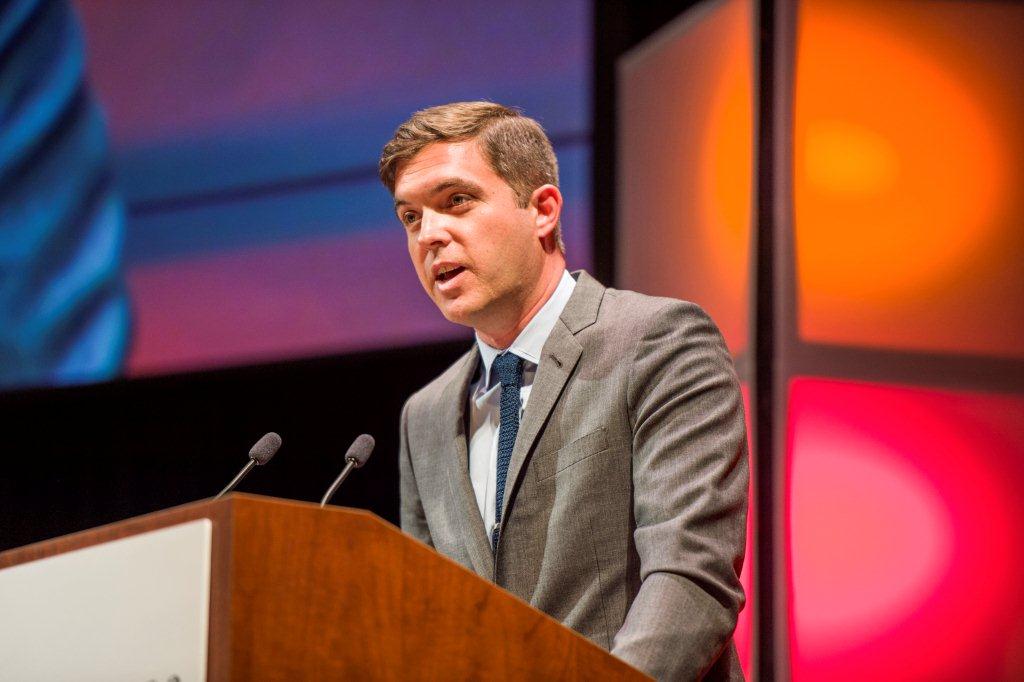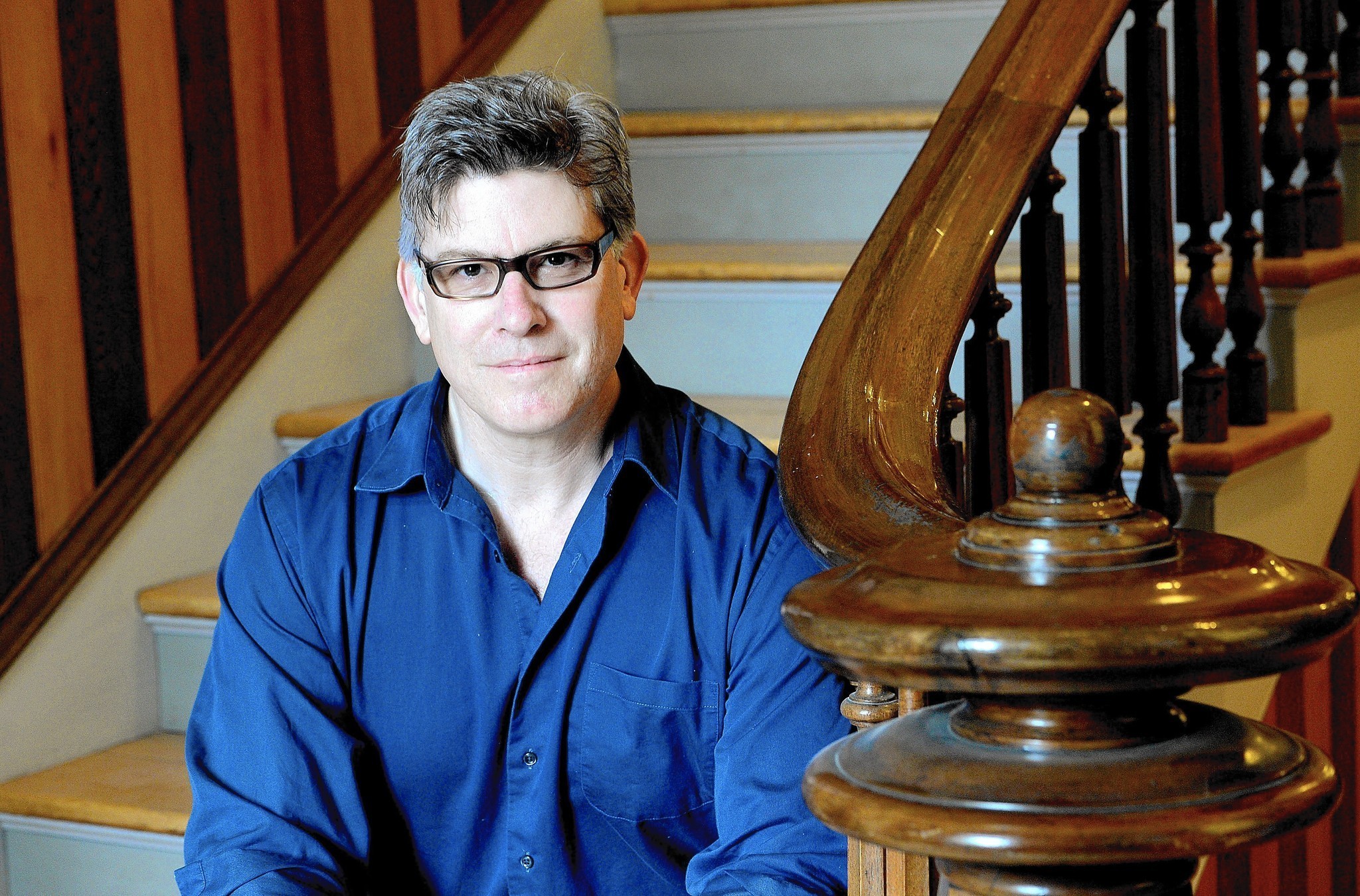Kevin Powers didn’t flinch when the novelist Thrity Umrigar asked him a pointed question—had he considered incorporating substantial Iraqi characters in his much-honored novel “The Yellow Birds”?
Power’s first book, an impressionist portrayal of combat and its consequences during the Iraq War, won an Anisfield-Wolf book prize this year for fiction. The National Book Award cited it as “an urgent, vital, beautiful novel that reminds us through its scrupulous honesty how rarely its anguished truths are told.”
Umrigar, a professor of creative writing at Case Western Reserve University best known for her novels “The Space Between Us” and “The World We Found,” politely asked if Powers had thought to write a story that “would give the Iraq people agency?”
Powers, 32, nodded vigorously, standing at a lectern on the Case campus, and said he’d weighed that question. “Because I’m telling this single soldier’s story, I wanted to be true to his perspective, his inability to understand the larger picture,” Powers said of his narrator, Private John Bartle. “I wanted to stay true to the distance, the chasm that exists, in an unformed young person, not capable of these interactions.”
Powers himself joined the U.S. Army the day after he turned 17, serving as a machine gunner in Iraq in 2004 and 2005. He was deployed “outside the wire,” backing up infantry and cavalry in units trying to find Improvised Explosive Devices before they found their targets.
Thoughtful, soft-spoken and given to the “y’alls” of his Richmond, Virginia upbringing, Powers took 20 minutes to read the final chapter of “The Yellow Birds” to his Baker-Nord Center audience. It awakened in several veterans a desire to speak about the burdens they bury, and carry, from the killing they did and the dying they witnessed. The atmosphere was tense, and Powers listened long and intently. Three times he responded to statements from veterans with a quiet “absolutely.”
Occasionally, Powers said, someone will object. They will note that “War is hell” and assert there is nothing new to say. But, “it still feels necessary to me,” he said. “Until we can say, ‘War was hell,’ then somebody needs to keep saying it. We shouldn’t have the excuse that we didn’t know how bad it was.”
The writer assured his listeners that the specifics of “The Yellow Birds” “are very different from my own experience,” but acknowledged that he drew upon his own guilt and shame and attempts to make sense of his memories in crafting the novel.
“I spent four years writing it, more or less, in isolation,” he said. “I didn’t know if anyone would publish it or read it.” He often wrote until 3 a.m., persisting, he said, because writing was the way he makes sense of the world.
“I can’t separate reading and writing,” he said. “If I wasn’t a reader, I wouldn’t be a writer. I simply have never found a better way of dealing with the confusion I feel when confronted with the world.”
Powers didn’t keep a journal as a soldier, saying he didn’t have the stamina, or the mental reserves. But the books his mother mailed him were a lifeline, and he wrote some letters. About two years ago, a friend showed him one that he’d sent to her.
“I could see the point in the letter where I almost opened up, but didn’t,” he said.
Next April 1, Powers will publish his first collection of poetry, “Letter Composed During a Lull in the Fighting.” And he has begun work on a second novel, set in hometown Richmond, the capital of the Confederacy, and the ashes of the Civil War.
He notes, “I will probably always be interested in the way that violence affects communities, how people respond to those sorts of situations and how people put a life together when not all the pieces are intact.”



Philip Metres
October 5, 2013
Thrity has it right, of course; Powers slipped into the innocence narrative too easily. As author he has a role to play to avoid that old story, which keeps placing our innocence (ignorance) first and foremost. It’s an imperial lie. Not that soldiers’ stories aren’t absolutely essential to tell, but it’s the frame that’s the problem. As writers at the center of empire, we cannot “give Iraqis agency,” but we can deconstruct our own narratives; the paradigmatic War Story valorizes an important voice (the voice of the everyday soldier), but what it never seems to be able to do to set into some larger context just why that voice comes to be in another country, and how that voice (and the body and technology which gird it) come to frame everything that we see about this other people. Imagine the reverse: we would not like it if another country’s soldiers came here and projected their reality and made their country the backdrop for their psychodrama. That’s my take.
Lisa Nielson
October 10, 2013
I fully agree with Dr. Metres’ comments about the place of war novels by American writers in valorizing the experience of U.S. soldiers as well as offering an entry point for the American reader to examine the effect of war on our military and culture. I also agree that it is essential for us to interrogate our motivations for war. Yet, Dr. Metres seems to suggest there is no extant Iraqi voice or authority, no deconstruction of the war from alternate perspectives, and that is, quite frankly, not true. Perhaps it is not his intent, but Dr. Metres also appears to be suggesting that is the job of the colonizer – meaning the U.S. – to locate that voice. I was present at both the reading and dinner afterward, and had the pleasure of hearing Mr. Powers and Professor Umrigar continue their discussion.
Mr. Powers is not merely echoing the imperialist party line; rather, he was candid about his decision to provide the voice he knows and not co-opt or colonize one he does not. Iraq has been a center of literature and scholarship for centuries; Iraqi writers have been contesting the colonial powers that have variously invaded or ruled the region in innumerable ways. There are many documentaries, blogs and novels in several languages rich with alternate narratives. One need only to walk through the book display at the Middle East Studies Association meetings, review lists of recent scholarly and literary publications or do a simple Google search to see how writers and scholars from Iraq, and the world, provide alternate, often harshly critical, perspectives. Not all of these resources are in English, but they exist and contest the American perspective on the war. It is important to remember that American literature is just one thread in the ongoing global discussion.
Philip Metres
October 12, 2013
As a postcolonial scholar and an Arab-American, I would concur with what you’re saying about the existence of alternative narratives, and the wariness that should attend representations of the other. And yes, Powers’ book is not explicitly imperialist. But two follow-up points: the narrowness of the frame is the narrowness of the imperial gaze as seen from the homefront. These are the stories that Americans seem to gravitate to. We have no end to our thirst for hearing that we were innocent, that it was a tragic mistake. Secondly, while these other narratives exist, how many people have read SHOOT AN IRAQI by artist Wafaa Bilal or DIARY OF A WAVE OUTSIDE THE SEA by Dunya Mikhail or countless other Iraqi-focused works, compared with the American soldier narratives? Not enough. Our wounds always seem to speak louder.
Anisfield-Wolf Book Awards | Anthony Marra Brings That New Author Magic To Cleveland September 10
August 22, 2014
[…] bring its author to Cleveland for the first time. He follows in the footsteps of Iraq War veteran Kevin Powers, who spoke last year about his own war novel, “The Yellow Birds” on the campus of Case Western […]